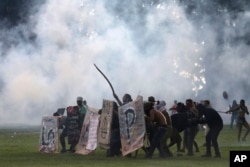Brazil's Senate on Tuesday approved a strict cap on federal spending in a first-round vote that hands a timely victory to President Michel Temer, who is struggling to restore fiscal discipline amid an economic recession and political crisis.
Demonstrators protesting the austerity measure burned cars and smashed windows of government buildings with rocks outside the Congress as the senators debated the spending ceiling.
The Senate voted by 61-14 to back the constitutional amendment that would limit federal spending to the rate of inflation for 20 years, with an option for a presidential revision after 10 years. It is expected to easily clear a second and final vote on Dec. 13.
Recession worst since 1930s
Brazil's leftist opposition said the spending cap proposed by Temer would cripple public education and health services. To make the bill more palatable, Temer proposed delaying cuts in education and health for a year, while insisting the spending curbs are needed to control a widening budget deficit that has cost Brazil its investment-grade credit rating.
The protests pointed to growing social unrest with Temer's belt-tightening drive as the economy flounders in its worst recession since the 1930s, which has left 12 million people out of work.
Police used teargas and pepper spray to disperse a crowd they estimated at 10,000 demonstrators on the ministry-lined central esplanade of Brasilia. Three cars were set on fire and walls were sprayed with graffiti calling for Temer's ouster.
The president, through a spokesman, condemned the vandalism and violence as an undemocratic form of pressure on Congress.
Students, peasants, activists lead protest
The demonstrations brought together students, landless peasants, labor union activists and members of the Workers Party carrying red flags. They also targeted lawmakers seeking an amnesty from prosecution for taking kickbacks in the corruption scandal surrounding state-run oil company Petrobras.
Approval of the spending cap by a comfortable margin should help Temer allay fears that another scandal rocking his Cabinet could undermine support for tough fiscal reforms.
Temer's six-month administration has been hurt by allegations by a former minister that the president pressured him to favor a property development permit sought by another of his Cabinet ministers and a close political ally.
Shares of local companies and the real currency fell last week after the new scandal broke, underpinning continued instability plaguing Latin America's largest nation after the removal of impeached leftist President Dilma Rousseff earlier this year.






